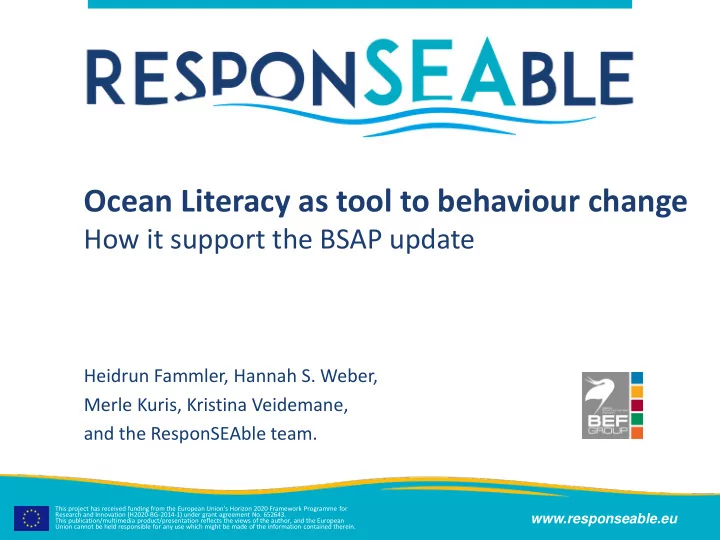

Ocean Literacy as tool to behaviour change How it support the BSAP update Heidrun Fammler, Hannah S. Weber, Merle Kuris, Kristina Veidemane, and the ResponSEAble team. This project has received funding from the European Union’s Horizon 2020 Framework Programme for Research and Innovation (H2020-BG-2014-1) under grant agreement No. 652643. www.responseable.eu This publication/multimedia product/presentation reflects the views of the author, and the European Union cannot be held responsible for any use which might be made of the information contained therein.
2 Chapter in the BSAP: Awareness raising and capacity building Raising awareness is not enough! Behavior change is needed to get more people “engaged” Capacity building must build on ocean literacy! Behavior change! www.responseable.eu
3 PROFESSIONAL ACTOR What does it take What does it mean to REGULATIVE ACTOR to become ocean be ocean literate? literate? INDIVIDUAL ACTOR SOCIAL ACTOR To understand your Specific knowledge on the influence on the ocean environment and human #1 and the ocean’s influence interactions on you. To understand your Knowledge on the specific influence as an #2 actors and their individual, professional interrelationships and social being. To be able to The ability to communicate communicate within and #3 responsibilities for the between actor groups ocean to others. www.responseable.eu
4 What did we do in ResponSEAble? • We defined key stories for the Regional seas andset up a system to structure knowledge on them based on the DAPSIWR framework WELFARE RESPONSES IMPACT DRIVERS STATE ACTIVITIES PRESSURES #1 www.responseable.eu
5 What did we do in ResponSEAble? (2) • We searched for the «nexus of influence» or «key actors» that would reduce the impact on the marine environment by changing behavior; • We visualized the Knowledge System on the Key Stories as pathways of information between actors; • We analysed the content of communications as focusses on different aspects of the Key Stories; We interviewed actors on where they get their • information and how the perceive it. #1 www.responseable.eu
6 Looking for Ocean Literacy of an old issue: EUTROPHICATION Specific knowledge on the environment and human interactions Driver - Activity - Pressure - State - Impact - Welfare - Response S P A Crop and livestock Water quality Pollution load D production (N&P concentrations) (N&P discharges) R W Markets I Demography Technologies Env. laws, rules, Other policies Impact on human Change in commitments health, economy biodiversity www.responseable.eu
7 Looking for Ocean Literacy of an old issue: EUTROPHICATION Knowledge on the specific actors and interrelationships Agricultural value chain: the set of actors and activities that bring a agricultural product from production in the field to final consumption Figure: Actors of the agricultural value chain (source: Story Map about Eutrophication, ResponSEAble) www.responseable.eu
8 Looking for Ocean Literacy of an old issue: EUTROPHICATION The ability to communicate within and between actor groups Who transfers knowledge to whom? Which information content is communicated? Media analysis 7 countries of the BSR Identification of key actors google advanced search, facebook, youtube total: 766 sources, 1326 receivers Figure: Baltic Sea (source: EUSBSR) www.responseable.eu
9 Looking for Ocean Literacy of an old issue: EUTROPHICATION The ability to communicate within and between actor groups DAPSI(W)R content: • Activity Pressure • • State/State change (impact) Largely uncovered: Driver • • Welfare Figure: Communicated DAPSI(W)R content, all countries (source: key story Eutrophication, ResponSEAble) www.responseable.eu
10 Current OL: learnings from the story of eutrophication Incomplete narratives: communication covers the frame of Activity – Pressure – State ; Drivers and Welfare are seldomly communicated Only a few actors are communicated to: main target groups: farmers and consumers almost no communication with.retailers, wholesalers Target group unspecific communication: the same story for all… Perception (survey): individual actors do not feel powerful enough farmers are seen as responsible for the issue www.responseable.eu
11 Behavior change: How to increase Ocean Literacy? Improving narratives: telling the entire story - to understand roles, responsibilities …..and circles of influence of actors Involving all actors: all actors must be communicated to and with Including social psychological factors: target group specific communication is crucial, knowledge alone is not enough Increase of cross-sectoral cooperation: facilitation of dialoges to find solutions at the source www.responseable.eu
12 How can we get this approach into the new BSAP? Get currently un-targeted groups such as retailers/wholesalers into the dialogue. (maybe under the phrase “risk management” as this is what they understand) It is important for HELCOM to assess which actors/stakeholders in the topics “hazardous substances” and “biodiversity” and “maritime issues” etc. have been overseen so far and get them onto the pro-Baltic Sea empowerment table. Tracking back which stakeholders/actors are usually creating boundaries and obstacles in the pro-ocean process. Don’t fight them with regulations, but understand their needs and language instead and create win-win solutions together. Behaviour change programmes need concrete actions adapted to the different environmental issues/human-environment interaction Information (guidance) on what individuals can do within their roles and circle of influences. Presenting of multi-benefits of actions: action not just because of one environmental issue but because of covering several (e.g. behaviour in food consumption helps eutrophication, climate change, ect.) www.responseable.eu
13 We are ready to contribute to the BSAP! www.responseable.eu
Recommend
More recommend